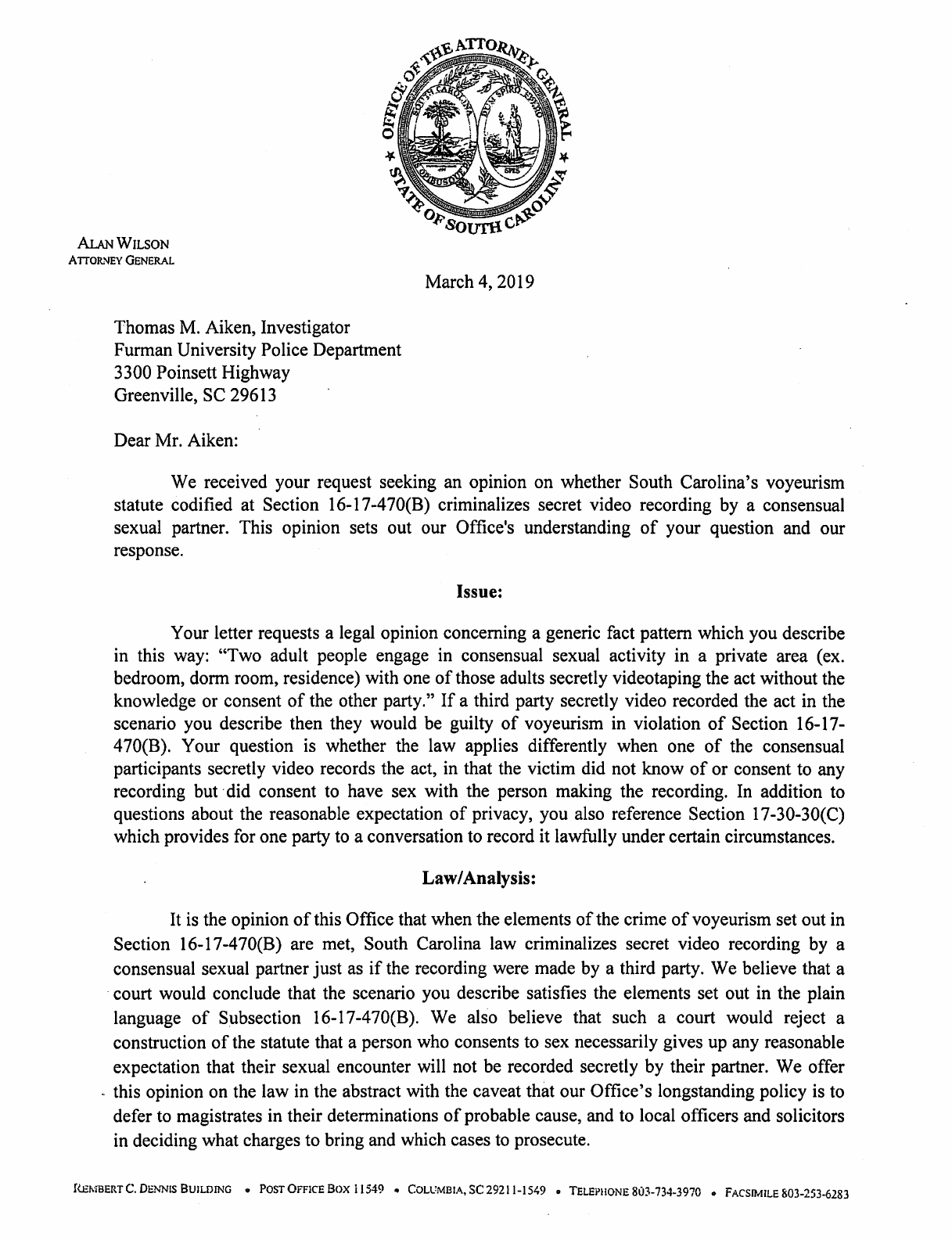
Alan
Wilson
Attorney
General
March
4,
2019
Thomas
M.
Aiken,
Investigator
Furman
University
Police
Department
3300
Poinsett
Highway
Greenville,
SC
29613
Dear
Mr.
Aiken:
We
received
your
request
seeking
an
opinion
on
whether
South
Carolina's
voyeurism
statute
codified
at
Section
16-17-470(6)
criminalizes
secret
video
recording
by
a
consensual
sexual
partner.
This
opinion
sets
out
our
Office's
understanding
of
your
question
and
our
response.
Issue:
Your
letter
requests
a
legal
opinion
concerning
a
generic
fact
pattern
which
you
describe
in
this
way:
"Two
adult
people
engage
in
consensual
sexual
activity
in
a
private
area
(ex.
bedroom,
dorm
room,
residence)
with
one
of
those
adults
secretly
videotaping
the
act
without
the
knowledge
or
consent
of
the
other
party."
If
a
third
party
secretly
video
recorded
the
act
in
the
scenario
you
describe
then
they
would
be
guilty
of
voyeurism
in
violation
of
Section
16-17-
470(B).
Your
question
is
whether
the
law
applies
differently
when
one
of
the
consensual
participants
secretly
video
records
the
act,
in
that
the
victim
did
not
know
of
or
consent
to
any
recording
but
did
consent
to
have
sex
with
the
person
making
the
recording.
In
addition
to
questions
about
the
reasonable
expectation
of
privacy,
you
also
reference
Section
17-30-30(C)
which
provides
for
one
party
to
a
conversation
to
record
it
lawfully
under
certain
circumstances.
Law/Analysis:
It
is
the
opinion
of
this
Office
that
when
the
elements
of
the
crime
of
voyeurism
set
out
in
Section
16-17-470(6)
are
met.
South
Carolina
law
criminalizes
secret
video
recording
by
a
consensual
sexual
partner
just
as
if
the
recording
were
made
by
a
third
party.
We
believe
that
a
court
would
conclude
that
the
scenario
you
describe
satisfies
the
elements
set
out
in
the
plain
language
of
Subsection
16-17-470(6).
We
also
believe
that
such
a
court
would
reject
a
construction
of
the
statute
that
a
person
who
consents
to
sex
necessarily
gives
up
any
reasonable
expectation
that
their
sexual
encounter
will
not
be
recorded
secretly
by
their
partner.
We
offer
-
this
opinion
on
the
law
in
the
abstract
with
the
caveat
that
our
Office's
longstanding
policy
is
to
defer
to
magistrates
in
their
determinations
of
probable
cause,
and
to
local
officers
and
solicitors
in
deciding
what
charges
to
bring
and
which
cases
to
prosecute.
ILEKiBERT
C.Dennis
Building
•
Post
Office
Box
11549
•
Columbia,
SC
29211-1549
.
Telephone
803-734-3970
•
Facsimile
803-253-6283

Thomas
M.
Aiken,
Investigator
Page
2
March
4,
2019
Section
16-17-470(B)
of
the
South
Carolina
Code
defines
the
crime
of
voyeurism:
A
person
commits
the
crime
of
voyeurism
if,
for
the
purpose
of
arousing
or
gratifying
sexual
desire
of
any
person,
he
or
she
knowingly
views,
photographs,
audio
records,
video
records,
produces,
or
creates
a
digital
electronic
file,
or
films
another
person,
without
that
person's
knowledge
and
consent,
while
the
person
is
in
a
place
where
he
or
she
would
have
a
reasonable
expectation
of
privacy.
S.C.
Code
Ann.
§
16-17-470(B)
(2015).
Subsection
16-17-470(D)
defines
certain
terms
used
in
the
statute,
including:
(1)
"Place
where
a
person
would
have
a
reasonable
expectation
of
privacy"
means:
(a)
a
place
where
a
reasonable
person
would
believe
that
he
or
she
could
disrobe
in
privacy,
without
being
concerned
that
his
or
her
undressing
was
being
photographed,
filmed,
or
videotaped
by
another;
or
(b)
a
place
where
one
would
reasonably
expect
to
be
safe
from
hostile
intrusion
or
surveillance.
(2)
"Surveillance"
means
secret
observation
of
the
activities
of
another
person
for
the
purpose
of
spying
upon
and
invading
the
privacy
of
the
person.
Before
discussing
the
application
of
this
text
to
the
scenario
presented
in
your
letter,
we
repeat
the
mandate
of
the
South
Carolina
Supreme
Court
concerning
statutory
construction:
The
cardinal
rule
of
statutory
construction
is
to
ascertain
and
effectuate
the
intent
of
the
legislature.
Under
the
plain
meaning
rule,
it
is
not
the
court's
place
to
change
the
meaning
of
a
clear
and
unambiguous
statute.
Where
the
statute's
language
is
plain
and
unambiguous,
and
conveys
a
clear
and
definite
meaning,
the
rules
of
statutory
interpretation
are
not
needed
and
the
court
has
no
right
to
impose
another
meaning.
What
a
legislature
says
in
the
text
of
a
statute
is
considered
the
best
evidence
of
the
legislative
intent
or
will.
Therefore,
the
courts
are
bound
to
give
effect
to
the
expressed
intent
of
the
legislature.
Hodges
v.
Rainey
,
341
S.C.79,
85,
533
S.E.2d
578,
581
(2000)
(internal
citations
and
quotations
omitted).
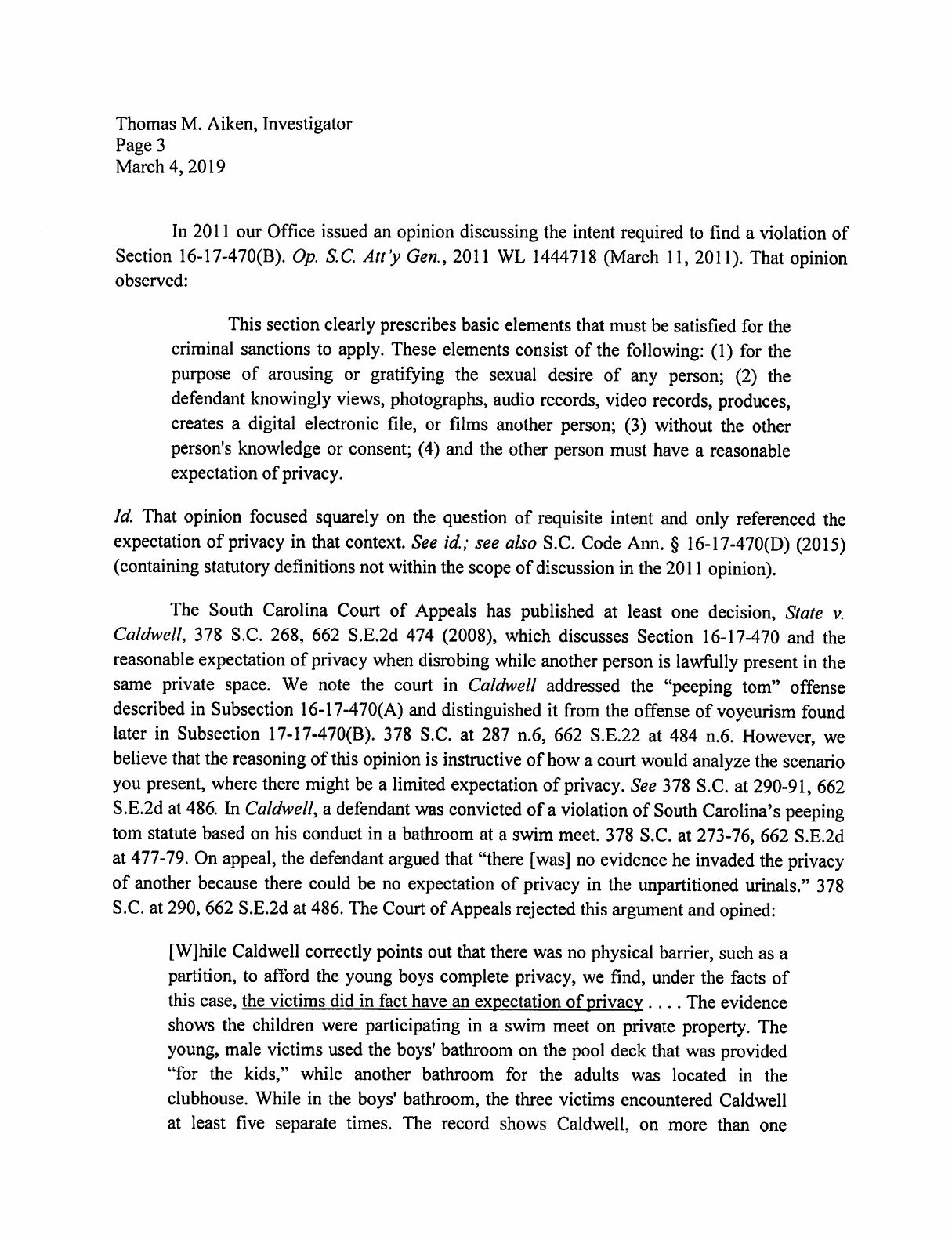
Thomas
M.
Aiken,
Investigator
Page
3
March
4,
2019
In
201
1
our
Office
issued
an
opinion
discussing
the
intent
required
to
find
a
violation
of
Section
16-17-470(B).
Op.
S.C.
Att'y
Gen.
,
2011
WL
1444718
(March
11,
2011).
That
opinion
observed:
This
section
clearly
prescribes
basic
elements
that
must
be
satisfied
for
the
criminal
sanctions
to
apply.
These
elements
consist
of
the
following:
(1)
for
the
purpose
of
arousing
or
gratifying
the
sexual
desire
of
any
person;
(2)
the
defendant
knowingly
views,
photographs,
audio
records,
video
records,
produces,
creates
a
digital
electronic
file,
or
films
another
person;
(3)
without
the
other
person's
knowledge
or
consent;
(4)
and
the
other
person
must
have
a
reasonable
expectation
of
privacy.
Id.
That
opinion
focused
squarely
on
the
question
of
requisite
intent
and
only
referenced
the
expectation
of
privacy
in
that
context.
See
id.;
see
also
S.C.
Code
Ann.
§
16-17-470(D)
(2015)
(containing
statutory
definitions
not
within
the
scope
of
discussion
in
the
201
1
opinion).
The
South
Carolina
Court
of
Appeals
has
published
at
least
one
decision,
State
v.
Caldwell
,
378
S.C.
268,
662
S.E.2d
474
(2008),
which
discusses
Section
16-17-470
and
the
reasonable
expectation
of
privacy
when
disrobing
while
another
person
is
lawfully
present
in
the
same
private
space.
We
note
the
court
in
Caldwell
addressed
the
"peeping
torn"
offense
described
in
Subsection
16-17-470(A)
and
distinguished
it
from
the
offense
of
voyeurism
found
later
in
Subsection
17-17-470(B).
378
S.C.
at
287 n.6,
662
S.E.22
at
484
n.6.
However,
we
believe
that
the
reasoning
of
this
opinion
is
instructive
of
how
a
court
would
analyze
the
scenario
you
present,
where
there
might
be
a
limited
expectation
of
privacy.
See
378
S.C.
at
290-91,
662
S.E.2d
at
486.
In
Caldwell
,
a
defendant
was
convicted
of
a
violation
of
South
Carolina's
peeping
torn
statute
based
on
his
conduct
in
a
bathroom
at
a
swim
meet.
378
S.C.
at
273-76,
662
S.E.2d
at
477-79.
On
appeal,
the
defendant
argued
that
"there
[was]
no
evidence
he
invaded
the
privacy
of
another
because
there
could
be
no
expectation
of
privacy
in
the
unpartitioned
urinals."
378
S.C.
at
290,
662
S.E.2d
at
486.
The
Court
of
Appeals
rejected
this
argument
and
opined:
[W]hile
Caldwell
correctly
points
out
that
there
was
no
physical
barrier,
such
as
a
partition,
to
afford
the
young
boys
complete
privacy,
we
find,
under
the
facts
of
this
case,
the
victims
did
in
fact
have
an
expectation
of
privacy
....
The
evidence
shows
the
children
were
participating
in
a
swim
meet
on
private
property.
The
young,
male
victims
used
the
boys'
bathroom
on
the
pool
deck
that
was
provided
"for
the
kids,"
while
another
bathroom
for
the
adults
was
located
in
the
clubhouse.
While
in
the
boys'
bathroom,
the
three
victims
encountered
Caldwell
at
least
five
separate
times.
The
record
shows
Caldwell,
on
more
than
one
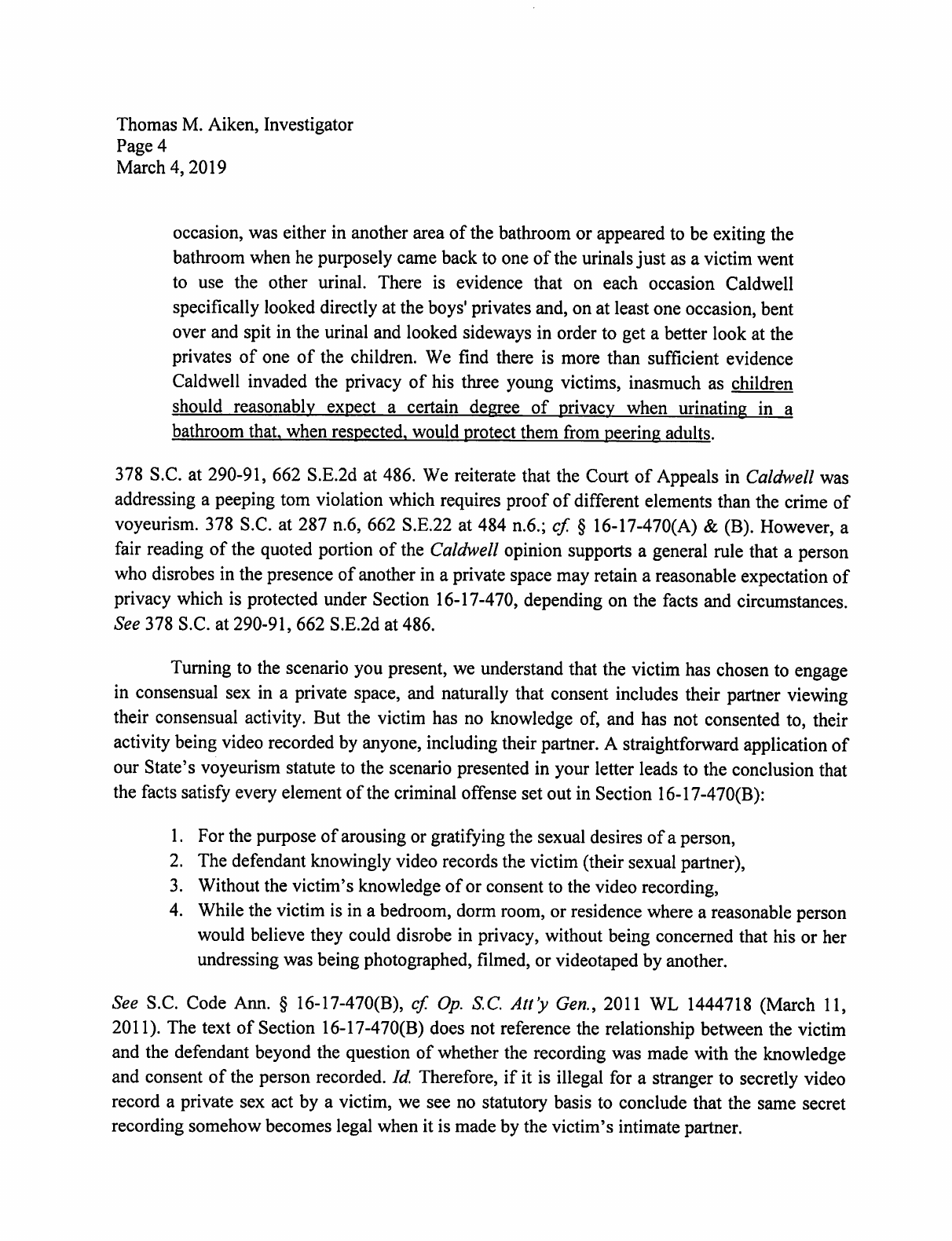
Thomas
M.
Aiken,
Investigator
Page
4
March
4,
2019
occasion,
was
either
in
another
area
of
the
bathroom
or
appeared
to
be
exiting
the
bathroom
when
he
purposely
came
back
to
one
of
the
urinals
just
as
a
victim
went
to
use
the
other
urinal.
There
is
evidence
that
on
each
occasion
Caldwell
specifically
looked
directly
at
the
boys'
privates
and,
on
at
least
one
occasion,
bent
over
and
spit
in
the
urinal
and
looked
sideways
in
order
to
get
a
better
look
at
the
privates
of
one
of
the
children.
We
find
there
is
more
than
sufficient
evidence
Caldwell
invaded
the
privacy
of
his
three
young
victims,
inasmuch
as
children
should
reasonably
expect
a
certain
degree
of
privacy
when
urinating
in
a
bathroom
that,
when
respected,
would
protect
them
from
peering
adults.
378
S.C.
at
290-91,
662
S.E.2d
at
486.
We
reiterate
that
the
Court
of
Appeals
in
Caldwell
was
addressing
a
peeping
torn
violation
which
requires
proof
of
different
elements
than
the
crime
of
voyeurism.
378
S.C.
at
287
n.6,
662
S.E.22
at
484
n.6.;
cf.
§
16-17-470(A)
&
(B).
However,
a
fair
reading
of
the
quoted
portion
of
the
Caldwell
opinion
supports
a
general
rule
that
a
person
who
disrobes
in
the
presence
of
another
in
a
private
space
may
retain
a
reasonable
expectation
of
privacy
which
is
protected
under
Section
16-17-470,
depending
on
the
facts
and
circumstances.
See
378
S.C.
at
290-91,
662
S.E.2d
at
486.
Turning
to
the
scenario
you
present,
we
understand
that
the
victim
has
chosen
to
engage
in
consensual
sex
in
a
private
space,
and
naturally
that
consent
includes
their
partner
viewing
their
consensual
activity.
But
the
victim
has
no
knowledge
of,
and
has
not
consented
to,
their
activity
being
video
recorded
by
anyone,
including
their
partner.
A
straightforward
application
of
our
State's
voyeurism
statute
to
the
scenario
presented
in
your
letter
leads
to
the
conclusion
that
the
facts
satisfy
every
element
of
the
criminal
offense
set
out
in
Section
16-1
7-470(B):
1
.
For
the
purpose
of
arousing
or
gratifying
the
sexual
desires
of
a
person,
2.
The
defendant
knowingly
video
records
the
victim
(their
sexual
partner),
3.
Without
the
victim's
knowledge
of
or
consent
to
the
video
recording,
4.
While
the
victim
is
in
a
bedroom,
dorm
room,
or
residence
where
a
reasonable
person
would
believe
they
could
disrobe
in
privacy,
without
being
concerned
that
his
or
her
undressing
was
being
photographed,
filmed,
or
videotaped
by
another.
See
S.C.
Code
Ann.
§
16-17-470(B),
cf.
Op.
SC.
Att'y
Gen.
,
2011
WL
1444718
(March
11,
201
1).
The
text
of
Section
16-17-470(B)
does
not
reference
the
relationship
between
the
victim
and
the
defendant
beyond
the
question
of
whether
the
recording
was
made
with
the
knowledge
and
consent
of
the
person
recorded.
Id.
Therefore,
if
it
is
illegal
for
a
stranger
to
secretly
video
record
a
private
sex
act
by
a
victim,
we
see
no
statutory
basis
to
conclude
that
the
same
secret
recording
somehow
becomes
legal
when
it
is
made
by
the
victim's
intimate
partner.
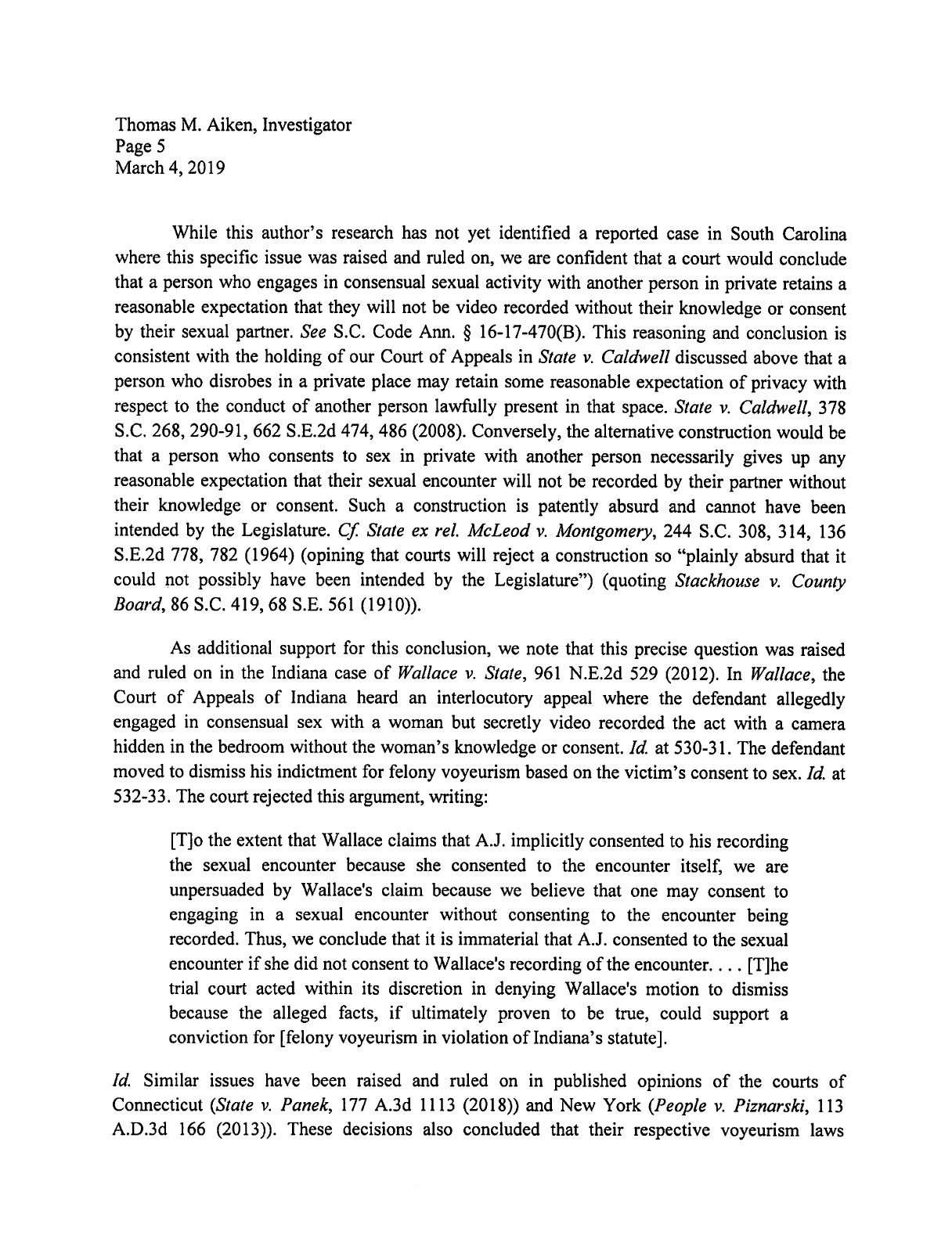
Thomas
M.
Aiken,
Investigator
Page
5
March
4,
2019
While
this
author's
research
has
not
yet
identified
a
reported
case
in
South
Carolina
where
this
specific
issue
was
raised
and
ruled
on,
we
are
confident
that
a
court
would
conclude
that
a
person
who
engages
in
consensual
sexual
activity
with
another
person
in
private
retains
a
reasonable
expectation
that
they
will
not
be
video
recorded
without
their
knowledge
or
consent
by
their
sexual
partner.
See
S.C.
Code
Ann.
§
16-17-470(B).
This
reasoning
and
conclusion
is
consistent
with
the
holding
of
our
Court
of
Appeals
in
State
v.
Caldwell
discussed
above
that
a
person
who
disrobes
in
a
private
place
may
retain
some
reasonable
expectation
of
privacy
with
respect
to
the
conduct
of
another
person
lawfully
present
in
that
space.
State
v.
Caldwell
,
378
S.C.
268,
290-91,
662
S.E.2d
474,
486
(2008).
Conversely,
the
alternative
construction
would
be
that
a
person
who
consents
to
sex
in
private
with
another
person
necessarily
gives
up
any
reasonable
expectation
that
their
sexual
encounter
will
not
be
recorded
by
their
partner
without
their
knowledge
or
consent.
Such
a
construction
is
patently
absurd
and
cannot
have
been
intended
by
the
Legislature.
Cf.
State
ex
rel.
McLeod
v.
Montgomery
,
244
S.C.
308, 314,
136
S.E.2d
778,
782
(1964)
(opining
that
courts
will
reject
a
construction
so
"plainly
absurd
that
it
could
not
possibly
have
been
intended
by
the
Legislature")
(quoting
Stackhouse
v.
County
Board
,
86
S.C.
419,
68
S.E.
561
(1910)).
As
additional
support
for
this
conclusion,
we
note
that
this
precise
question
was
raised
and
ruled
on
in
the
Indiana
case
of
Wallace
v.
State
,
961
N.E.2d
529
(2012).
In
Wallace
,
the
Court
of
Appeals
of
Indiana
heard
an
interlocutory
appeal
where
the
defendant
allegedly
engaged
in
consensual
sex
with
a
woman
but
secretly
video
recorded
the
act
with
a
camera
hidden
in
the
bedroom
without
the
woman's
knowledge
or
consent.
Id.
at
530-31.
The
defendant
moved
to
dismiss
his
indictment
for
felony
voyeurism
based
on
the
victim's
consent
to
sex.
Id.
at
532-33.
The
court
rejected
this
argument,
writing:
[T]o
the
extent
that
Wallace
claims
that
A.J.
implicitly
consented
to
his
recording
the
sexual
encounter
because
she
consented
to
the
encounter
itself,
we
are
unpersuaded
by
Wallace's
claim
because
we
believe
that
one
may
consent
to
engaging
in
a
sexual
encounter
without
consenting
to
the
encounter
being
recorded.
Thus,
we
conclude
that
it
is
immaterial
that
A.J.
consented
to
the
sexual
encounter
if
she
did
not
consent
to
Wallace's
recording
of
the
encounter.
. . .
[T]he
trial
court
acted
within
its
discretion
in
denying
Wallace's
motion
to
dismiss
because
the
alleged
facts,
if
ultimately
proven
to
be
true,
could
support
a
conviction
for
[felony
voyeurism
in
violation
of
Indiana's
statute].
Id.
Similar
issues
have
been
raised
and
ruled
on
in
published
opinions
of
the
courts
of
Connecticut
(
State
v.
Panek
,
177
A.3d
1113
(2018))
and
New
York
{People
v.
Piznarski
,
113
A.D.3d
166
(2013)).
These
decisions
also
concluded
that
their
respective
voyeurism
laws
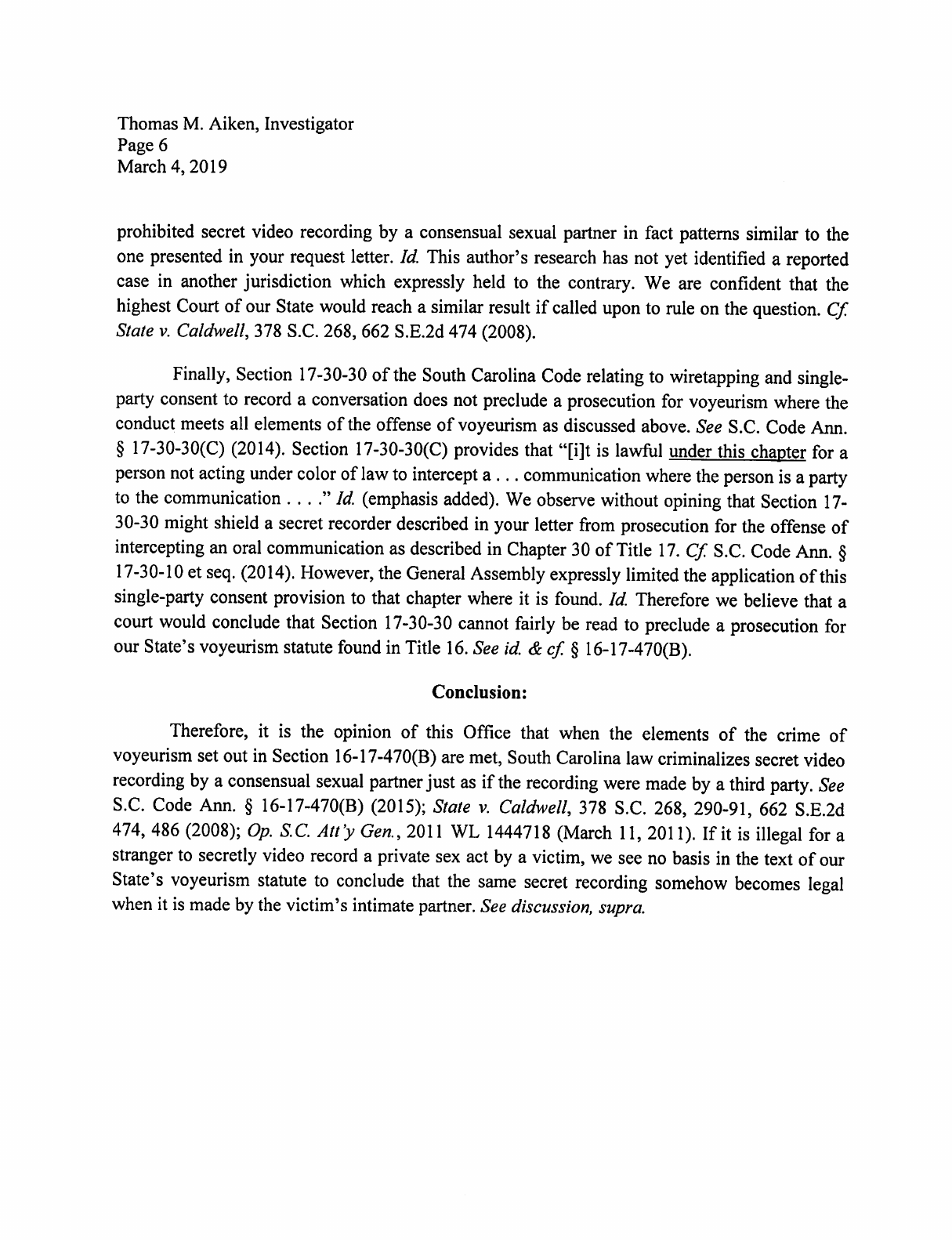
Thomas
M.
Aiken,
Investigator
Page
6
March
4,
2019
prohibited
secret
video
recording
by
a
consensual
sexual
partner
in
fact
patterns
similar
to
the
one
presented
in
your
request
letter.
Id.
This
author's
research
has
not
yet
identified
a
reported
case
in
another
jurisdiction
which
expressly
held
to
the
contrary.
We
are
confident
that
the
highest
Court
of
our
State
would
reach
a
similar
result
if
called
upon
to
rule
on
the
question.
Cf
State
v.
Caldwell
,
378
S.C.
268,
662
S.E.2d
474
(2008).
Finally,
Section
17-30-30
of
the
South
Carolina
Code
relating
to
wiretapping
and
single-
party
consent
to
record
a
conversation
does
not
preclude
a
prosecution
for
voyeurism
where
the
conduct
meets
all
elements
of
the
offense
of
voyeurism
as
discussed
above.
See
S.C.
Code
Ann.
§
17-30-30(C)
(2014).
Section
17-30-30(C)
provides
that
"[i]t
is
lawful
under
this
chapter
for
a
person
not
acting
under
color
of
law
to
intercept
a
. . .
communication
where
the
person
is
a
party
to
the
communication
.
. .
."
Id.
(emphasis
added).
We
observe
without
opining
that
Section
17
30-30
might
shield
a
secret
recorder
described
in
your
letter
from
prosecution
for
the
offense
of
intercepting
an
oral
communication
as
described
in
Chapter
30
of
Title
11.
Cf
S.C.
Code
Ann.
§
17-30-10
et
seq.
(2014).
However,
the
General
Assembly
expressly
limited
the
application
of
this
single-party
consent
provision
to
that
chapter
where
it
is
found.
Id.
Therefore
we
believe
that
a
court
would
conclude
that
Section
17-30-30
cannot
fairly
be
read
to
preclude
a
prosecution
for
our
State's
voyeurism
statute
found
in
Title
16.
See
id.
&
cf.
§
16-17-470(B).
Conclusion:
Therefore,
it
is
the
opinion
of
this
Office
that
when
the
elements
of
the
crime
of
voyeurism
set
out
in
Section
16-17-470(B)
are
met,
South
Carolina
law
criminalizes
secret
video
recording
by
a
consensual
sexual
partner
just
as
if
the
recording
were
made
by
a
third
party.
See
S.C.
Code
Ann.
§
16-17-470(B)
(2015);
State
v.
Caldwell
,
378
S.C.
268,
290-91,
662
S.E.2d
474,
486
(2008);
Op.
S.C.
Att'y
Gen.,
2011
WL
1444718
(March
11,
2011).
If
it
is
illegal
for
a
stranger
to
secretly
video
record
a
private
sex
act
by
a
victim,
we
see
no
basis
in
the
text
of
our
State's
voyeurism
statute
to
conclude
that
the
same
secret
recording
somehow
becomes
legal
when
it
is
made
by
the
victim's
intimate
partner.
See
discussion
,
supra.
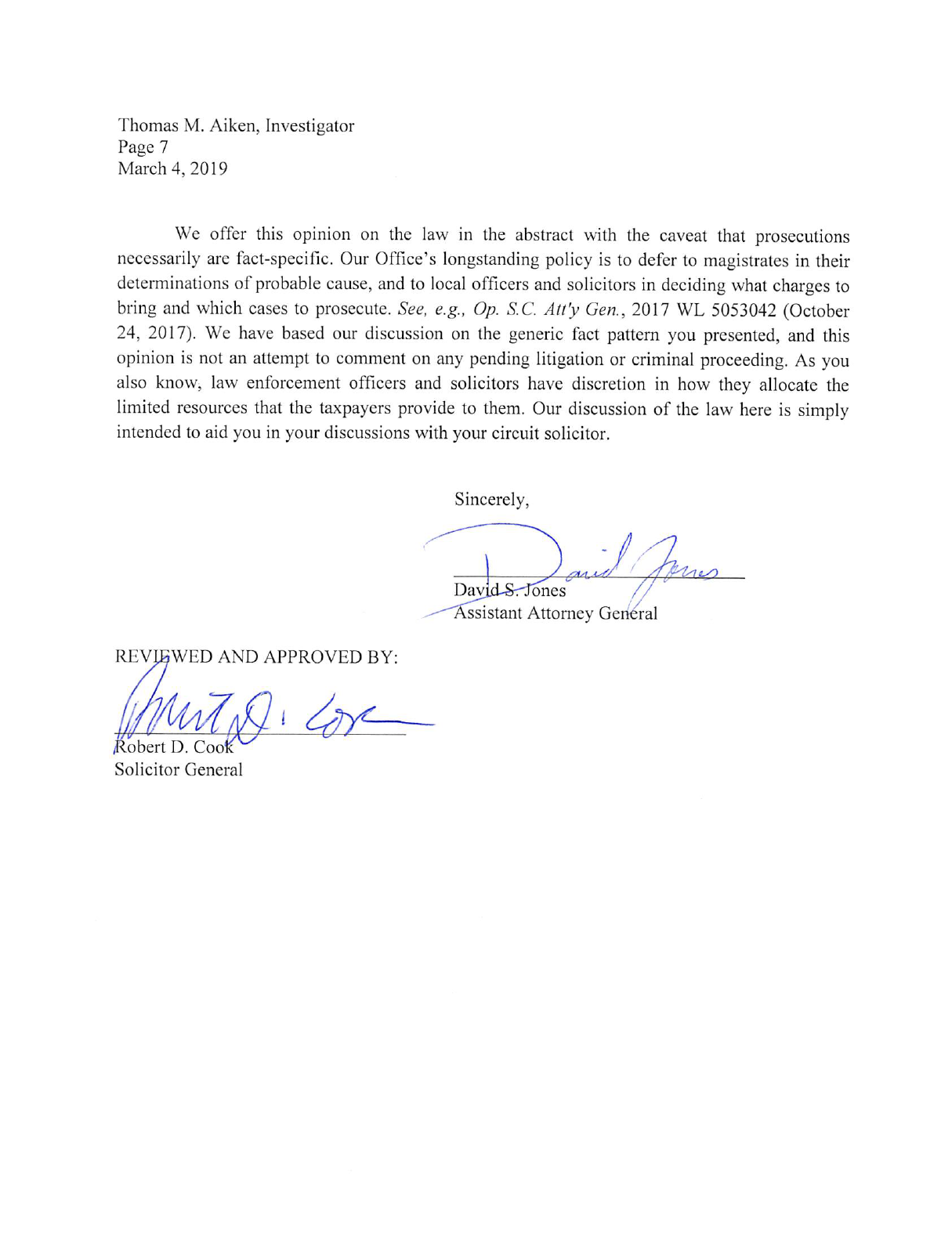
Thomas
M.
Aiken,
Investigator
Page
7
March
4,
2019
We
offer
this
opinion
on
the
law
in
the
abstract
with
the
caveat
that
prosecutions
necessarily
are
fact-specific.
Our
Office's
longstanding
policy
is
to
defer
to
magistrates
intheir
determinations
of
probable
cause,
and
to
local
officers
and
solicitors
in
deciding
what
charges
to
bring
and
which
cases
to
prosecute.
See,
e.g.,
Op.
S.C.
Att'y
Gen.,
2017
WL
5053042
(October
24,
2017).
We
have
based
our
discussion
on
the
generic
fact
pattern
you
presented,
and
this
opinion
is
not
an
attempt
to
comment
on
any
pending
litigation
or
criminal
proceeding.
As
you
also
know,
law
enforcement
officers
and
solicitors
have
discretion
in
how
they
allocate
the
limited
resources
that
the
taxpayers
provide
to
them.
Our
discussion
of
the
law
here
is
simply
intended
to
aid
you
in
your
discussions
with
your
circuit
solicitor.
Sincerely,
f-U.
<^7
DavicUSr'Jones
^Assistant
Attorney
General
REVIEWED
AND
APPROVED
BY:
/Robert
D.
Coo1
Solicitor
General
